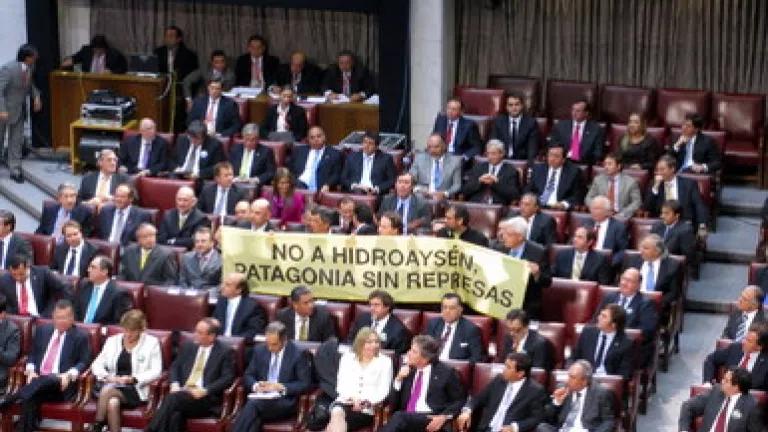Appeals Court Rules in Favor of HidroAysén - and Sends our Case to Chile's Supreme Court

With a split 2-1 vote, the Court of Appeals in Puerto Montt announced its much-anticipated - yet ultimately misguided - decision late last week to uphold the environmental approval of HidroAysén’s mega-dam proposal in Chilean Patagonia. The ruling demonstrates how proponents of environmental and human rights face an uphill battle when pitted against major corporate interests. The same groups and individuals who filed the appeal have vowed to continue that battle –which has become the largest environmental fight in Chile’s history– in the only recourse left: by going to the Supreme Court. As this next stage of our campaign against the destructive mega-dams begins, you can support our allies in Chile by sending a message to President Piñera.
HidroAysén, a private venture between two of the largest energy companies in Chile, plans to build five dams on Patagonia’s wild Baker and Pascua Rivers, in order to send 2,750 MW per year to the main grid around Santiago, 2000 kilometers north. This past May, the project received its environmental approval from the regional authority after a three-year –and highly flawed—review process, despite the fact that the company’s environmental impact assessment (EIA) was woefully deficient. Having scrupulously documented the failings of both the assessment and the review process, a group of Parliamentarians, mayors, local business owners and civil society organizations appealed the dams’ approval. The fact that the Puerto Montt Court of Appeals agreed to consider their case was the first time a government decision-maker signaled that it would not merely accept HidroAysén and rush the project through its permitting process. The Court even prohibited any construction on the dams while it considered the appeal. Yet the Court’s controversial decision last week lifted the ban on the dams’ construction, giving HidroAysén a green light.
The lead lawyer for opponents to HidroAysén, Marcelo Castillo, stands by their case, asserting that “we believe we have the background and legal arguments showing that the Environmental Assessment Commission’s decision violates constitutional rights and is illegal.” What, exactly, do their arguments demonstrate?
The appeal case consists of seven major points; as presented in the court documents, they are (briefly):
- Several actions taken by authorities during the actual procedure of the review were technically illegal. For example, when HidroAysén first presented its environmental impact assessment in 2008, the document lacked relevant and essential information, including several of the most basic requirements for such documents, like accurate baseline information and maps of the areas to be affected. The authority should have rejected the proposal right away and not given the company the chance to continue the review process.
- The expected impacts on the huemul, a highly-endangered Andean deer and national symbol of Chile were incorrectly measured and evaluated, and therefore the company’s mitigation plan is inadequate. HidroAysén’s dams would flood huemul habitat, putting one of the last healthy populations in the country at risk of extinction.
- The authority made decisions arbitrarily during the review process, not adhering to national laws or international treaties. For example, HidroAysén would flood a portion of Laguna San Rafael National Park, violating Chile’s own national law, as well as an international treaty that Chile is a party to. The authority, however, disregarded protections under the law and treaty in approving the project.
- The approval violates the constitutional rights of the citizens who the project would affect, such as the right to live in an environment free of pollution. The government also has a duty to maintain and uphold the areas it has set aside for protection, such as Laguna San Rafael National Park. By allowing impacts in those areas, the government is not protecting citizens’ rights.
- HidroAysén dishonestly presented its proposal to authorities, misrepresenting the project’s baseline by first describing the dams and transmission line as part of one project, and then fragmenting the two into separate environmental reviews. Therefore, the approved environmental impact assessment didn’t evaluate all of the project’s impacts because it did not include those of the transmission line.
- The authority arbitrarily decided to truncate the period for public participation in 2008, thereby excluding citizens’ comments from the review process. For example, a group of local artisanal fishermen whose livelihoods would be affected by the dams did not have the opportunity to comment on the project because the 60-day comment period was shortened.
- HidroAysén ignored the social and environmental impacts that the influx of an estimated 2260 workers would have on this rural region during the 11.5 year-construction phase. HidroAysén’s base of operations would be in the town of Cochrane which during the last census was estimated to have a population just under 2600. The massive project would nearly double the size of the town with new workers, some of whom would also bring their families – increasing pressure on the town’s resources.
In his decision, the judge who voted against HidroAysén agreed with these arguments, at one point stating that the authority, “should have ordered an immediate Consolidated Evaluation Report (ICE), rejecting the project, so that a new proposal could be submitted that followed environmental regulations and protected national parks.”
He is not alone. In fact, 74 percent of Chileans are against HidroAysén. Tens of thousands of people took to the streets throughout the country after the approval in May and June, launching the civil protests that continue through today with the widespread student movement. President Sebastian Piñera’s approval rating fell after the approval and has further plummeted with the student protests that have captivated – and paralyzed – the country.
Members of Congress protesting HidroAysén's approval during President Piñera's national address in May 2011
On October 15, Chileans will again voice their opposition to HidroAysén in Santiago’s central Plaza Italia. You can join them by sending a message to President Piñera.
Hopefully, the Supreme Court will listen.

